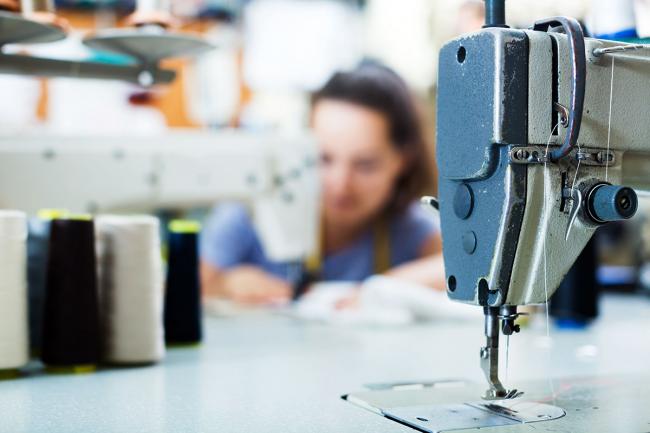Topics
Shop Floor Control, CSR and Sustainability

Shop Floor Control and the Circular Economy
Among the many good reasons to invest in shop floor control (SFC) technology, sustainability may not be the first that comes to mind. In fact, shop floor control influences several important variables around sustainability, corporate social responsibility (CSR) and the circular economy. To better understand the variables, let’s first define these concepts.
Sustainability
Sustainability is becoming a movement in the fashion industry. According to the U.N., the apparel industry consumes more energy than the aviation and shipping sectors combined. This means the apparel industry accounts for 10 percent of global carbon emissions. There is also greater consumer awareness of fashion’s environmental and social impact. This includes excess products in landfills, factory conditions and production process effluents. More consumers are passionate about accountable brands with supply chain transparency and proof they live up to socially responsible values. In the CGS 2019 U.S. Consumer Sustainability Survey, more than 1,000 consumers were surveyed as to their buying habits, revealing that more than two-thirds consider sustainability when making a purchase and are willing to pay more for sustainable products.
The Circular Economy
The circular economy is product lifecycle management (PLM) at its sustainable best. Businesses committed to circular economics strive to design, develop, source, distribute and dispose of their products in ways that:
- Minimize waste
- Reduce energy consumption
- Lessen pollution
- Decrease freshwater use
- Conserve and protect ecologic resources
- Eliminate or reduce hazardous chemical use
- Avoid other environmental and socioeconomic impacts
“Sustainability in fashion doesn’t come easy,” says Mihaela Coapsi, vice president, Manufacturing Systems, CGS. “However, it can be achieved with the help of technology that meets the fashion industry’s specific needs and adapts itself to the business.”
Shop Floor Control
One of these adaptable technologies is shop floor management software. Shop floor control solutions, such as CGS BlueCherry® Shop Floor Control, are real-time, cloud-based systems for planning and tracking production and increasing efficiency. Shop floor control can be tailored to unique business requirements. In an analogy that is fitting for this period, when so many professionals are blending home and work, Coapsi likens businesses to households. “Every business is different,” she said. “They have their own products and their own way of managing. It’s like a home, and each home runs by its own rules.”
Likewise, a modern shop floor control solution is configured to manage different factory floors, production lines and products. Regardless of product differences, the end goal for most companies is the same: Improving efficiency.
In a typical soft goods shop floor control implementation, touchscreen tablets or terminal devices are installed at each production workstation. Operators use these wireless terminals to clock in, start work on bundles, view construction procedures and alert supervisors or mechanics of issues. They also can view their individual productivity and earnings. The shop floor control solution feeds operator productivity data directly to the payroll system, eliminating manual tracking and data entry. Additionally, engineers and managers use SFC data for planning and line balancing to accelerate throughput. The shop floor monitoring solution gives stakeholders across the apparel supply chain greater visibility. Operators understand their individual progress, suppliers see exactly where work orders stand, and they can let customers know that production is on track to meet expectations.
Empower People and Improve Productivity
People are the most important pillar of corporate social responsibility and need to be treated properly, given a safe workplace, paid fairly and empowered. Smart companies are leveraging shop floor control with a focus on people first. They realize that, when manufacturing associates are valued and empowered, they are motivated to achieve greater productivity, better attendance and higher quality. Where there is a strong CSR culture, workers have good visibility into their performance and pay and know how to open lines of communication with management. With the proper shop floor control product, employees can:
- View real-time progress against target goals
- Review videos and other instructions, in their native languages, on touchscreen tablets
- Learn the latest technology to help them excel at their job
- Gain a sense of pride and control over their own destinies on the job
- Clearly correlate improving their skills, quality and speed with gaining higher productivity and pay
- Build trust between themselves and their employer
“People are the foundation of every company,” Coapsi said. “The stronger they are, the stronger the company is. Most companies are structured like pyramids with the operators as the foundation. It is not enough for the top leaders to be strong if the foundation is weak. SFC increases the strength of the operators, mechanics and supervisors who form the base for better functionality of a production manufacturing floor.”
Shop floor control technology also streamlines and enhances communication across the factory. For example, if an operator’s machine breaks down, he or she can alert a mechanic through the tablet rather than first needing to call for a supervisor, who in turn would call for maintenance. With fewer links in this communication chain, maintenance gets to work faster on issues, reducing downtime and bottlenecks. Additionally, when they are not busy triaging maintenance issues, supervisors can focus on value-added activities like answering operator questions, addressing challenges and keeping production on target.
All these variables enhance shop floor productivity, enabling businesses to both increase and improve the quality of production with the same number of operators.
CGS BlueCherry® Shop Floor Control also equips businesses with reporting capabilities to support documentation requirements for labor law, regulatory compliance, inspections and audits. These reports provide buyers with greater transparency into suppliers’ factory operations. With SFC installed across the supply chain, businesses have greater visibility into subcontractor operations. Shop floor control reports help confirm contractors and subcontractors are producing within their capacity constraints. This keeps contractors from outsourcing work orders to unknown parties or running unpaid or underpaid overtime.
Sustain the Planet and Grow Profits
After focusing on a company’s people, the other key pillar to sustainability is the planet, which needs protecting to ensure future generations can enjoy a healthy, thriving existence. Shop floor control solutions help businesses meet important sustainability and CSR goals related to both pillars while maximizing profit. The Fashion Industry Charter for Climate Action is one such effort to drive fashion industry production to net-zero greenhouse gas emissions by no later than 2050.
Shop floor control drives digital processes in the factory, reducing waste and consumption of resources. When companies embrace shop floor control, they not only go greener environmentally, but also help stay in the green financially. Shop floor management solutions help companies work toward achieving zero-waste goals. For example, with the seamless interface between operator shop floor control terminals and payroll systems, much less paper is required for payroll processing. There is no need for punch cards or gum-sheet tickets. Also, when there is a PLM interface with shop floor tools, operators and supervisors can consult tablets for tech packs, construction details and operation instructions. This lessens or eliminates the need for multiple tech pack printouts.
Reducing paper is a great first step and reducing material waste is even better environmentally for apparel factories. SFC helps businesses to get production right the first time. When operators are better-trained and make fewer mistakes, fewer rejected products and scrapped materials are produced. This improved quality is especially important to reduce waste in sampling. The PLM interface with shop floor control gives operators easy access to helpful illustrations, 3D samples, construction details and instructions. Samples are more likely to be right the first time, reducing rounds.
Another benefit of right-first-time production is reduced need for air shipping, which carries a high environmental footprint and cost. When time is not lost because of errors, defects and rework, orders stay on track to meet delivery deadlines without adding expedited shipping costs.
Shop floor control gives management teams tools for predictive line balancing. With collaboration from an experienced technology provider, a BlueCherry Shop Floor Control implementation leverages accurate engineering standards and lean, cutting-edge manufacturing methods. Leaders can be sure that people, machines and materials are optimized for maximum efficiency. Additionally, shop floor control’s real-time work-in-process visibility enables companies to manage multiple style complexities without losing time to manual counting and analysis. These factors reduce risk for missed delivery dates and help maintain ecofriendly air shipping schedules.
BlueCherry Shop Floor Control helps businesses get the right products of the right quality on the selling floor while fashion trends are hot. This contributes to fewer returns, which incur high costs and environmental impacts of packaging and transportation. It also reduces excess inventory destined for the landfill. Right product, right place, right time = less waste overall = a more sustainable supply chain.
Ready to see how shop floor control will boost your brand’s circular economics and sustainability? Contact CGS today to ask about BlueCherry® Shop Floor Control. Let’s work together to achieve your productivity and CSR objectives for 2021.

